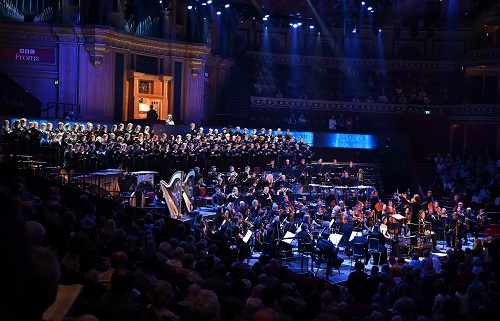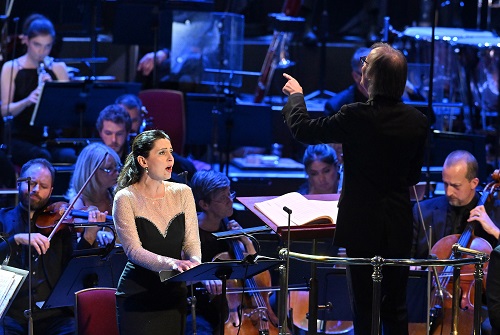I am sure one could find something these two works had in common if one tried; one always can. The question is whether it would be anything more than a parlour game trick to do so. For instance, does saying that both composers, Jennifer Walshe and Johannes Brahms, assembled (many of) the words they set from pre-existing texts shed light on anything? Not really. Perhaps there is something less tenuous in regarding both as having a memorial element, Walshe’s The Site of an Investigation being dedicated to the memory of a friend, the actor Stephen Swift. Again, though, I am not sure that helps connect Walshe and Brahms’s music. It is probably better to treat this Prom as a performance of two contrasting works and leave it at that.
The Site of an Investigation, from 2018, presents a more eclectic range of texts and responds to them in similarly eclectic fashion. From tweets to NASA’s plans for Mars: there is certainly a world (and beyond) to choose from, and that kaleidoscopic intent seems to be part of the point, perhaps unified only in Walshe’s own highly varied, amplified vocal delivery. I am tempted to call it performance art, given ‘events’ such as percussionists wrapping a giraffe in brown paper, twirling ribbons, and building a little tower with plastic boxes, the final act set against a pop-minimalist orchestral backdrop. ‘My horizon goal/is a surface landing/on MARS!’ and—all fall down. Tonal music, deliberately (I think) banal, is soon invaded or derided in the ‘Normal person’ section, in which we hear of someone’s need to receive 200 social media likes. It is all highly anarchic, though also (again, I think) directed at contemporary mores, often used in themselves as found material. Its big-heartedness is inviting, likewise its sheer fearlessness (surely allied). Was that an initial reference to Beethoven’s Ninth Symphony? It is now too long ago for me to be sure either way, but perhaps it is more important to think of John Cage’s deconstructionism, a post-Andy Warhol pop aesthetic, or even a Charles Ives-like orchestral riot in between ‘it’s hard ot tell exactly where the hate is coming from’ and the first advent of the wind machine. Perhaps, or perhaps not. Rather than seek for antecedents, I suspect it is better simply to listen here in the moment and take what you will—if anything. I rather enjoyed the half-hour or so it took and afterwards felt perplexed as to what to make of it. Over to you.

If I say that I feel more at home with Brahms, that is not necessarily a value judgement, simply a statement of fact. I certainly liked this performance from the National Youth Choir of Great Britain, the BBC Scottish Symphony Orchestra, and Ilan Volkov. What struck me, in addition to a startlingly slow tempo, in the opening chorus was the cultivated quality of the BBC SSO strings, as if a chamber group—or perhaps a small Bach orchestra, writ a little larger. It was not all maudlin, though, far from it; rarely have I heard such joy (aptly enough on ‘Freuden’) as in these young voices’ rendition under Volkov, both sides clearly responding to one another. This movement very much set the scene for what was to come: not only dark yet consoling, but also with moments of Baroque joy such as Bach, Handel, and the many earlier composers in whom Brahms so immersed himself both as composer and as choral director might well have recognised (at least in ahistorical fantasy).
The sarabande that followed flowed beautifully without rushing; choral singing was nicely responsorial. Volkov kept a tight rein on dynamic contrasts, exercising them to maximum effect. A special words should be said for the BBC SSO’s angelic harps. (It probably helped that I was seated near them.) At any rate, this was a properly severe apostolic pronouncement that yet consoled, even prior to the uplift wrought by Isiaiah’s return of the ransomed. That final section was taken at quite a lick, but it worked. It also contrasted well with the confiding intimacy of ‘Herr, lehre doch mich,’ bass-baritone Shenyang contributing with keen intelligence to the sense of cumulative power in a moving homily. Patience, as Brahms certainly knew, is a virtue. Release at its close, the souls of the righteous in God’s hands, where no torment shall touch them, both paralleled and took further that at the close of the preceding number.

‘Wie lieblich sind deine Wohnungen’ and ‘Ihr habt nun Traurigkeit’ exuded sweetness without saccharine, the first bringing (however silly this may sound) summer strawberries to my mind. It was brisk, yet breathed, Volkov ensuring a fine sense of the longer line. Elena Tsallagova sometimes sounded tremulous in the latter, but at her best imparted a fine sense of a maternal angel leading us (Brahms included) on. There was no doubting our role as band of pilgrims in ‘Denn wir haben hie keine bleibende Statt’. Seeking that city to come, we were in need of a guide and received one, the Royal Albert Hall organ (Richard Gowers) underlining that in a highly physical, again consoling, way. The struggle to come both terrified and thrilled, St Paul, Bach, and the rest personally yet universally synthesised for us in the here and now. (There are many ways to be contemporary.) Its final words from Revelation, Brahms’s music summoning up memories of Handel and Mendelssohn, without ever sounding ‘like’ them, brought us close to completion, though it was no easy journey. There was, however, one chorus still to go, the final step—tonal as well as theological, any such distinction meaningless. This may not be liturgical music, but it strongly conveyed the sense of a closing, seraphic benediction. It bade us good night and fortified us softly yet surely, as Brahms often does.
Mark Berry
Jennifer Walshe (voice); Elena Tsallagova (soprano); Shenyang (bass-baritone); National Youth Choir of Great Britain (chorus director: Ben Parry); BBC Scottish Symphony Orchestra/Ilan Volkov (conductor).
Jennifer Walshe – The Site of an Investigation (London premiere); Johannes Brahms – Ein deutsches Requiem Op.45
Royal Albert Hall, London; Thursday 28th July 2022.
ABOVE: Elena Tsallagova, Ilan Volkov and Shenyang (c) BBC/Mark Allan